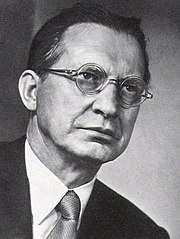
Christian Democracy was a Christian democratic political party in Italy. The DC was founded on 15 December 1943 in the Italian Social Republic as the nominal successor of the Italian People's Party, which had the same symbol, a crusader shield. As a Catholic-inspired, centrist, catch-all party comprising both centre-right and centre-left political factions, the DC played a dominant role in the politics of Italy for fifty years, and had been part of the government from soon after its inception until its final demise on 16 January 1994 amid the Tangentopoli scandals. Christian Democrats led the Italian government continuously from 1946 until 1981. The party was nicknamed the "White Whale" due to its huge organisation and official colour. During its time in government, the Italian Communist Party was the largest opposition party.
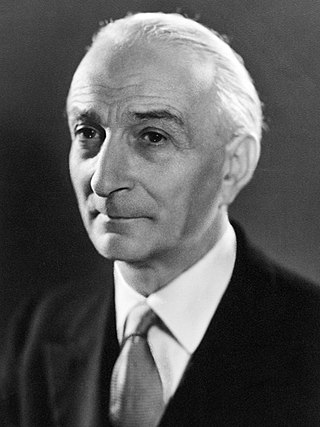
Antonio Segni was an Italian politician and statesman who served as President of Italy from 1962 to 1964, and as Prime Minister of Italy in from 1955 to 1957 and again from 1959 to 1960.

Alcide Amedeo Francesco De Gasperi was an Italian politician and statesman who founded the Christian Democracy party and served as prime minister of Italy in eight successive coalition governments from 1945 to 1953.
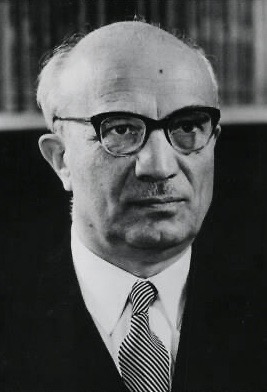
Amintore Fanfani was an Italian politician and statesman, who served as 32nd prime minister of Italy for five separate terms. He was one of the best-known Italian politicians after the Second World War and a historical figure of the left-wing faction of Christian Democracy. He is also considered one of the founders of the modern Italian centre-left.
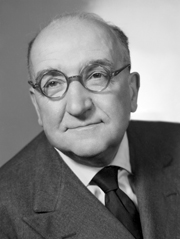
Adone Alvaro Ugo Natale Camillo Zoli was an Italian politician who served as the 35th prime minister of Italy from May 1957 to July 1958; he was the first senator to have ever held the office.

Fernando Tambroni Armaroli was an Italian politician. A member of Christian Democracy, he served as the 36th Prime Minister of Italy from March to July 1960. He also served as Minister of the Interior from July 1955 until February 1959, Minister of Budget and Treasury from February 1959 to March 1960, and Minister of the Merchant Navy from August 1953 until July 1955.
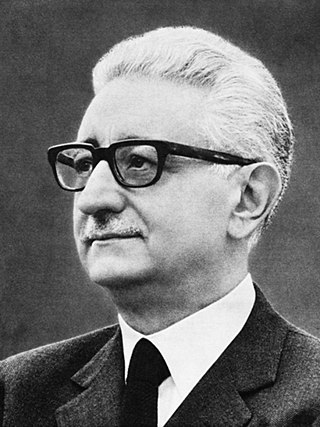
Giovanni Leone was an Italian politician, jurist and university professor who was President of Italy from 1971 to 1978. A founding member of Christian Democracy (DC), Leone briefly served as Prime Minister of Italy from June to December 1963 and again from June to December 1968. He was also President of the Chamber of Deputies from 1955 to 1963.

The Italian Republican Party is a political party in Italy established in 1895, which makes it the oldest political party still active in the country. The PRI identifies with 19th-century classical radicalism, as well as Mazzinianism, and its modern incarnation is associated with liberalism, social liberalism, and centrism. The PRI has old roots and a long history that began with a left-wing position, being the heir of the Historical Far Left and claiming descent from the political thought of Giuseppe Mazzini and Giuseppe Garibaldi. With the rise of the Italian Communist Party and the Italian Socialist Party (PSI) to its left, it was associated with centre-left politics. The early PRI was also known for its anti-clerical, anti-monarchist, republican, and later anti-fascist stances. While maintaining those traits, during the second half of the 20th century the party moved towards the centre on the left–right political spectrum, becoming increasingly economically liberal.

Mario Scelba was an Italian politician and statesman who was the 33rd prime minister of Italy from February 1954 to July 1955. A founder of Christian Democracy (DC), Scelba was one of the longest-serving Minister of the Interior in the history of the republic, having served at the Viminale Palace in three distinct terms from 1947 to 1962.

Giuseppe Pella was an Italian Christian Democratic politician and statesman who served as the 31st prime minister of Italy from 1953 to 1954. He was also Minister of Treasury, Budget and of Foreign Affairs during the 1950s and early 1960s. Pella served as President of the European Parliament from 1954 to 1956 after the death of Alcide De Gasperi.

The 1953 Italian general election was held in Italy on Sunday 7 June 1953.

The 1979 Italian general election was held in Italy on 3 June 1979. This election was called just a week before the European elections.

The Legislature I of Italy was the 1st legislature of the Italian Republic, and lasted from 8 May 1948 until 24 June 1953. Its composition was the one resulting from the general election of 18 April 1948.

The Legislature II of Italy was the 2nd legislature of the Italian Republic, and lasted from 25 June 1953 until 11 June 1958. Its composition was the one resulting from the general election of 7 June 1953.

The Legislature III of Italy was the 3rd legislature of the Italian Republic, and lasted from 12 June 1958 until 15 May 1963. Its composition was the one resulting from the general election of 25 May 1958.

The Legislature IX of Italy was the 9th legislature of the Italian Republic, and lasted from 12 July 1983 until 1 July 1987. Its composition was the one resulting from the general election of 26 and 27 June 1983. The election was called by President Sandro Pertini one year before the previous legislature's natural end on 5 May 1983, after a crisis in the incumbent government majority (Pentapartito).
The Pentapartito, commonly shortened to CAF, refers to the coalition government of five Italian political parties that formed between June 1981 and April 1991. The pro-European and Atlanticist coalition comprised the Christian Democracy (DC), the Italian Socialist Party (PSI), Italian Democratic Socialist Party (PSDI), Italian Liberal Party (PLI), and Italian Republican Party (PRI).

All Milan residents who are at least 18 years old and hold an EU citizenship are eligible to vote for the mayor and the City Council, as well as for the president and the Council of the Municipality where they reside.

The Segni I Cabinet was the 11th cabinet of the Italian government which held office from 6 July 1955 until 20 May 1957, for a total of 683 days, or 1 year, 10 months and 13 days.
All Rome residents who are at least 18 years old and hold an EU citizenship are eligible to vote for the Mayor and the 48 members of the Capitoline Assembly, as well as for the President and the 30 or 40 members of the Council of the Municipality where they reside.
